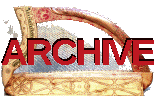
|
Sources for Gaelic harp music
the Bunting manuscripts

Edward Bunting (1773-1843) was an organist in Belfast. He was the most important collector of old Gaelic harp music, because he wrote down tunes and information direct from the playing of the last of the old Gaelic harpers.
In 1792, Bunting was commissioned by the organisers of the Belfast harpers’ meeting (commonly known now as the Belfast Harp Festival), to write down the old Irish tunes played by the harpers. He was so intruiged by the music played by these elderly harpers that he spent a lot of the rest of his life collecting tunes and information from them across Ireland.
Bunting's working method was to sit down with the harper and make a very rapid transcription of the music into his pocket notebook as they played. These transcription are very messy but seem to be pretty accurate impressions of what the harpers actually played in each performance. Then later, he would transfer the tune across into his desk notebook, tidying it up, and adding basic piano harmonisation and key signature etc. as he did so. The transcription and / or earlier neater copies of the tune, would be crossed out in pencil. This procedure (of copying to a new book and adjusting the tune and harmony in the process) could be repeated again and again until Bunting had worked out a romantic piano arrangement to his satisfaction.
Bunting also wrote down a lot of background information from the harpers, some of it scribbled in the margins of his field notebooks, some in the form of letters and other documents.
Bunting’s manuscripts are preserved at Queens University Library, Belfast. They are catalogued as MS4. Each individual item is listed by number, e.g. “Queen’s University Belfast, Special Collections MS4/29”, colloquially known as “Bunting manuscript 29”. There is a catalogue and index by Colette Moloney that tries to number every tune in the manuscripts, and references them by folio numbers; however, the Library doesn’t use either of these systems. Some of the manuscripts have page numbers written on the pages; some have more than one set of pagination. So it is very hard to reference a page.
Bunting wrote up his work for publication, and he issued three volumes of piano music each with an introduction describing the music and the collecting. These three books were very influential.
Simon Chadwick